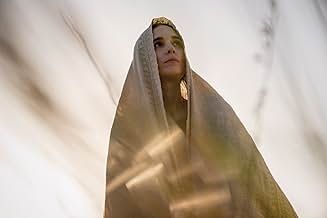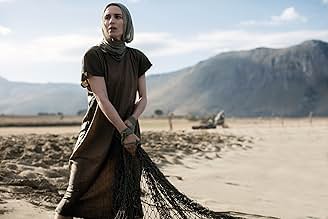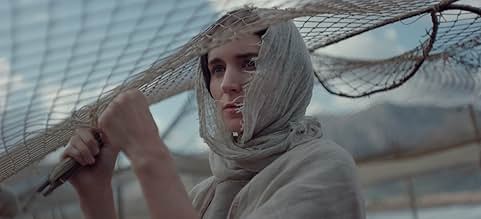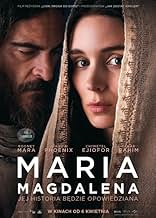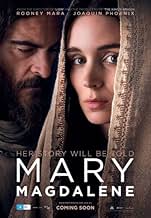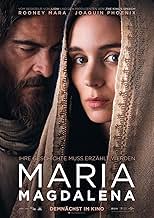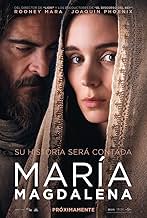NOTE IMDb
5,9/10
12 k
MA NOTE
Douze hommes ont entendu et diffusé le message de Jésus. Une seule femme l'a compris.Douze hommes ont entendu et diffusé le message de Jésus. Une seule femme l'a compris.Douze hommes ont entendu et diffusé le message de Jésus. Une seule femme l'a compris.
- Réalisation
- Scénario
- Casting principal
- Récompenses
- 2 victoires et 5 nominations au total
Avis à la une
The story of the last weeks of Jesus Christ told out of the perspective of the first ever feminist, Mary Magdalene.
It is an interpretation of the bible and the new found redemption of Mary Magdalene by the Vatican in 2016. Rooney Mara plays the title role and gives quite a solid performance. The material given to her is rather limited, but mostly due to the fact the the film feels terribly edited and cut down. Its a good performance but nothing she will win awards for. Joaquin Phoenix plays Jesus. He did have some good moments but generally feels miscast. He played Jesus too rough and too edgy. I mean edgy is good, but he often felt like a homeless vagabond preaching around with his not less weird followers. Not quite Charles Manson like but close. Chiwetel Ejifor was fine but he was rather wasted except for his scene at the end.
The film is very nice to look at. Cinematography is great. The whole look and feel is accurate and it has a nice score. It did feel too modern often . the way the talk, the way they gestured and Rooney Mara's pierced ears did not help. I really would like to see Garth Davis' uncut version of it.
Well I really wanted to love it, but I couldn't. I had been waiting for this to come out ever since it unexpectedly got shelved during the whole Weinstein fiasco. I finally saw it on Good Friday l, at the only Bay Area theater that was showing it - in San Jose - which surprised me.
I did love the premise, and I thought a movie from Mary Magdalene's point of view was a great idea. But I couldn't feel a connection to the characters. It seemed Phoenix's Jesus was at times too angry and distant. The editing seemed off too. Scenes jumped from one to another and I found myself yawning a few times. But Mara did a great job. I gave it a 7.
I did love the premise, and I thought a movie from Mary Magdalene's point of view was a great idea. But I couldn't feel a connection to the characters. It seemed Phoenix's Jesus was at times too angry and distant. The editing seemed off too. Scenes jumped from one to another and I found myself yawning a few times. But Mara did a great job. I gave it a 7.
Mary Magdalene, according to the Gospels, was a follower of Jesus as one of his followers and was a witness to His crucifixion, burial, and resurrection. In Christian tradition she has frequently been described as a repentant prostitute, although there is no Biblical authority to support this theory or her identification with either the anonymous "sinful woman" who anoints Jesus's feet or with the equally anonymous "woman taken in adultery". There is also no evidence to support the theory occasionally put forward (e.g. in "The Da Vinci Code") that she and Jesus were married. Another assumption which has been made is that she was wealthy, and there is some Biblical support for this in that Luke refers to her supporting Jesus's ministry "out of her resources".
In this film, however, Mary Magdalene is a poor girl from Magdala on the Sea of Galilee. The real Magdala appears to have been a sizeable and prosperous town, but here it is depicted as a small and impoverished fishing village. She becomes a follower of Jesus, but her presence in His circle is not always welcomed by His male disciples. This is not simply a question of male chauvinism; there are also theological and ideological differences between Mary and the other disciples.
In the Gospels Judas Iscariot betrays Jesus for money, but it has become almost a cliché in New Testament biblical dramas to depict Judas as a Zealot, a freedom fighter hoping to liberate Judea from the control of the Roman Empire, an interpretation adopted in both "King of Kings" and "The Greatest Story Ever Told", even though there is no Biblical support for it. According to this interpretation Judas betrayed Jesus either in a bid to force Him to launch a Holy War against the Romans or out of disappointment that Jesus would not do so. This interpretation is followed in this film, except that here it is not just Judas who is a Zealot. All the other male disciples, especially Peter, hold similar views.
Mary Magdalene, however, is different. In a development again not found in the canonical Gospels (although it may derive some support from the non-canonical Gnostic Gospels) she is the only one who fully understands Jesus, that his is a message of peace and forgiveness, not of Holy War against the godless, and who helps to bring the male disciples (except Judas) round to this way of thinking.
There is nothing really wrong with Rooney Mara's performance in the main role, but she does not really stand out. The one outstanding performance comes from Joaquin Phoenix. Some might argue that Phoenix, aged 44 but looking considerably older behind that heavy beard, was too old to play Jesus, who died when He was only 33. Yet I think that there was probably a conscious decision on the part of the film-makers to get away from a young, handsome Jesus as portrayed by Robert Powell in "Jesus of Nazareth" or Jeffrey Hunter in "King of Kings" (aka "I Was a Teenage Jesus") and that the reasoning behind this decision was to downplay the idea that Mary's attraction to Jesus was sexual or romantic rather than spiritual. Phoenix gives us a deeply human Jesus, very different from traditional Christian ideas about the Second Person of the Trinity, co-equal and co-eternal with the Father. This is no charismatic orator or commanding religious leader but a humble carpenter's son turned itinerant preacher, a man whose appeal is grounded not in blazing rhetoric or miraculous powers but in his humility and his faith in God, a faith which remains unshaken despite moments of doubt. The film is very different to the traditional large-scale Biblical epic. It appears to have been made on a relatively small budget, lacking the elaborate sets and costumes and the large-scale set-piece scenes of something like "The Greatest Story...". It is austere in its visual style and the characters mostly wear plain homespun garments appropriate to their humble origins. It can at times be ponderous and slow-moving, yet there is a rugged simplicity and sincerity about it which means that it is able to bring Christianity to life in a way which more grandiose productions (and here I am thinking particularly of "The Greatest Story...") are not. 7/10
In this film, however, Mary Magdalene is a poor girl from Magdala on the Sea of Galilee. The real Magdala appears to have been a sizeable and prosperous town, but here it is depicted as a small and impoverished fishing village. She becomes a follower of Jesus, but her presence in His circle is not always welcomed by His male disciples. This is not simply a question of male chauvinism; there are also theological and ideological differences between Mary and the other disciples.
In the Gospels Judas Iscariot betrays Jesus for money, but it has become almost a cliché in New Testament biblical dramas to depict Judas as a Zealot, a freedom fighter hoping to liberate Judea from the control of the Roman Empire, an interpretation adopted in both "King of Kings" and "The Greatest Story Ever Told", even though there is no Biblical support for it. According to this interpretation Judas betrayed Jesus either in a bid to force Him to launch a Holy War against the Romans or out of disappointment that Jesus would not do so. This interpretation is followed in this film, except that here it is not just Judas who is a Zealot. All the other male disciples, especially Peter, hold similar views.
Mary Magdalene, however, is different. In a development again not found in the canonical Gospels (although it may derive some support from the non-canonical Gnostic Gospels) she is the only one who fully understands Jesus, that his is a message of peace and forgiveness, not of Holy War against the godless, and who helps to bring the male disciples (except Judas) round to this way of thinking.
There is nothing really wrong with Rooney Mara's performance in the main role, but she does not really stand out. The one outstanding performance comes from Joaquin Phoenix. Some might argue that Phoenix, aged 44 but looking considerably older behind that heavy beard, was too old to play Jesus, who died when He was only 33. Yet I think that there was probably a conscious decision on the part of the film-makers to get away from a young, handsome Jesus as portrayed by Robert Powell in "Jesus of Nazareth" or Jeffrey Hunter in "King of Kings" (aka "I Was a Teenage Jesus") and that the reasoning behind this decision was to downplay the idea that Mary's attraction to Jesus was sexual or romantic rather than spiritual. Phoenix gives us a deeply human Jesus, very different from traditional Christian ideas about the Second Person of the Trinity, co-equal and co-eternal with the Father. This is no charismatic orator or commanding religious leader but a humble carpenter's son turned itinerant preacher, a man whose appeal is grounded not in blazing rhetoric or miraculous powers but in his humility and his faith in God, a faith which remains unshaken despite moments of doubt. The film is very different to the traditional large-scale Biblical epic. It appears to have been made on a relatively small budget, lacking the elaborate sets and costumes and the large-scale set-piece scenes of something like "The Greatest Story...". It is austere in its visual style and the characters mostly wear plain homespun garments appropriate to their humble origins. It can at times be ponderous and slow-moving, yet there is a rugged simplicity and sincerity about it which means that it is able to bring Christianity to life in a way which more grandiose productions (and here I am thinking particularly of "The Greatest Story...") are not. 7/10
The simple way of explaining this movie is imagine if Terence Malick filmed it, but he attempted to make the feel of it to be like a Tarkovskij film. I had a decent time watching "Mary Magdalene". You can look at the pictures and performances and see the beauty of the story. Yet, I hate to say it: It slows down and becomes un-eventful too many times. The director Garth Evans went the melancholic route were you are supposed to feel like you are wandering the landscapes with Jesus and his apostles. The world is a silent and lonely one, and there's barely much happiness going on. Jesus may spread wisdom, hope and kindness. Although here he keeps that sad stare as if something is troubling him. I think it was supposed to symbolize serenity, but it made him seem more depressed. Every adaptation of the Jesus story presents a different interpretation and here again, they give you a slightly sorrowful looking Joaquin Phoenix. He wasn't bad at all though. Just somewhat distracting at first because I kept thinking of his character in "Inherent Vice". As the movie progressed I got used this version. So it was alright. You can't hate Phoenix any way. He's a nice guy. Rooney Mara is wonderful as Mary. She carries a lot of this movie as its told from her perspective. I enjoyed her interaction with the rest of the apostles as well as her mutual respect and connection to what Jesus wanted to say. She struggles in the difficult world, but maintains that inner warmth that you need when you comfort someone in need.
I think the film is OK. The slow parts drag and there are only so many melancholic stares you can endure before you go: "Come on, guys. I get it". It's supposed to a realistic approach. You hear the sounds of nature and the breeze of the wind as you wander the fields with short grass. All of that is nice. But it's constantly dramatic and quiet. I wanted to see some more kindness and optimism to show us more nuances from the characters. You've seen the Jesus story be told many times and here's another one. It's not bad, but it lacked a special punch of uniqueness. I think "Last Days in the Desert" handled the quiet melancholic version of the tale better. This is not a bad attempt, but more of an underwhelming one. It's beautiful to look at and you have nice people who you follow. But it leaves you feeling more empty than you should. I respect what Mary Magdalene did and I'm happy I got to understand her perspective. But I don't think I ever have to see this entire movie again. Only recommended to loyal fans of the people involved making the film and those who are interested in the different adaptations the Jesus story.
I think the film is OK. The slow parts drag and there are only so many melancholic stares you can endure before you go: "Come on, guys. I get it". It's supposed to a realistic approach. You hear the sounds of nature and the breeze of the wind as you wander the fields with short grass. All of that is nice. But it's constantly dramatic and quiet. I wanted to see some more kindness and optimism to show us more nuances from the characters. You've seen the Jesus story be told many times and here's another one. It's not bad, but it lacked a special punch of uniqueness. I think "Last Days in the Desert" handled the quiet melancholic version of the tale better. This is not a bad attempt, but more of an underwhelming one. It's beautiful to look at and you have nice people who you follow. But it leaves you feeling more empty than you should. I respect what Mary Magdalene did and I'm happy I got to understand her perspective. But I don't think I ever have to see this entire movie again. Only recommended to loyal fans of the people involved making the film and those who are interested in the different adaptations the Jesus story.
Great acting, great perspective, great story.
It is strange that this idea could put a bad taste into someones mouth- that it is OUR responsibility to save the world - pretty much the opposite message of "sola fide" - the doctrine introduced by the Lutheran church that it is only through faith in the divinity of Jesus alone and not through works we achieve "salvation". Centuries of self-identified "Christians" with no real love of peace, truth or compassion at the helm of the West and look where it has gotten us... millions of Christians await Christ's return yet make no serious effort to live by Christ's teachings. That is the sore thumb and the tragedy of many of the efforts of modern evangelists
Ironically, a movie that is supposed to be about Mary Magdalene is the best cinematic telling of the Jesus story that I have seen - it takes care to communicate understandably how Jesus's real teachings could become skewed by disciples who had their own ideas about the way they thought things should be, or would prefer them to be. They helped create in their folly a system of belief which removes personal responsibility and promotes complacent self righteousness in apathy which seems so common today.
The message of personal responsibility is so crucial in these times when it feels like the world is speeding ever so quickly towards irreversible change - where that change is directed is up to us and if we are all sitting on our thumbs we may neglect our own responsibility and contributions in the matter. That someone could be made angry or put off by this idea seems incomprehensible to me
It is strange that this idea could put a bad taste into someones mouth- that it is OUR responsibility to save the world - pretty much the opposite message of "sola fide" - the doctrine introduced by the Lutheran church that it is only through faith in the divinity of Jesus alone and not through works we achieve "salvation". Centuries of self-identified "Christians" with no real love of peace, truth or compassion at the helm of the West and look where it has gotten us... millions of Christians await Christ's return yet make no serious effort to live by Christ's teachings. That is the sore thumb and the tragedy of many of the efforts of modern evangelists
Ironically, a movie that is supposed to be about Mary Magdalene is the best cinematic telling of the Jesus story that I have seen - it takes care to communicate understandably how Jesus's real teachings could become skewed by disciples who had their own ideas about the way they thought things should be, or would prefer them to be. They helped create in their folly a system of belief which removes personal responsibility and promotes complacent self righteousness in apathy which seems so common today.
The message of personal responsibility is so crucial in these times when it feels like the world is speeding ever so quickly towards irreversible change - where that change is directed is up to us and if we are all sitting on our thumbs we may neglect our own responsibility and contributions in the matter. That someone could be made angry or put off by this idea seems incomprehensible to me
Le saviez-vous
- AnecdotesRooney Mara and Joaquin Phoenix started dating during the production of this film.
- GaffesWhen Mary Magdalen leaves the lake after being baptized, her wet dress is slightly opaque and clinging. The straps to her bra or bikini top are noticeable.
- Citations
[first lines]
Mary Magdalene: And she asked him, "What will it be like? The kingdom?" And he said, "It is like a seed, a single grain of mustard seed, which a woman took and sowed in her garden. And it grew and it grew. And the birds of the air made nests in its branches."
- ConnexionsFeatured in Projector: Mary Magdalene (2018)
- Bandes originalesPsalm 121
Traditional, arranged by Sophia Brous
Performed by Tchéky Karyo
Meilleurs choix
Connectez-vous pour évaluer et suivre la liste de favoris afin de recevoir des recommandations personnalisées
- How long is Mary Magdalene?Alimenté par Alexa
Détails
- Date de sortie
- Pays d’origine
- Sites officiels
- Langues
- Aussi connu sous le nom de
- María Magdalena
- Lieux de tournage
- Sociétés de production
- Voir plus de crédits d'entreprise sur IMDbPro
Box-office
- Montant brut aux États-Unis et au Canada
- 124 741 $US
- Week-end de sortie aux États-Unis et au Canada
- 46 646 $US
- 14 avr. 2019
- Montant brut mondial
- 11 710 110 $US
- Durée
- 2h(120 min)
- Couleur
- Rapport de forme
- 2.20 : 1
Contribuer à cette page
Suggérer une modification ou ajouter du contenu manquant







